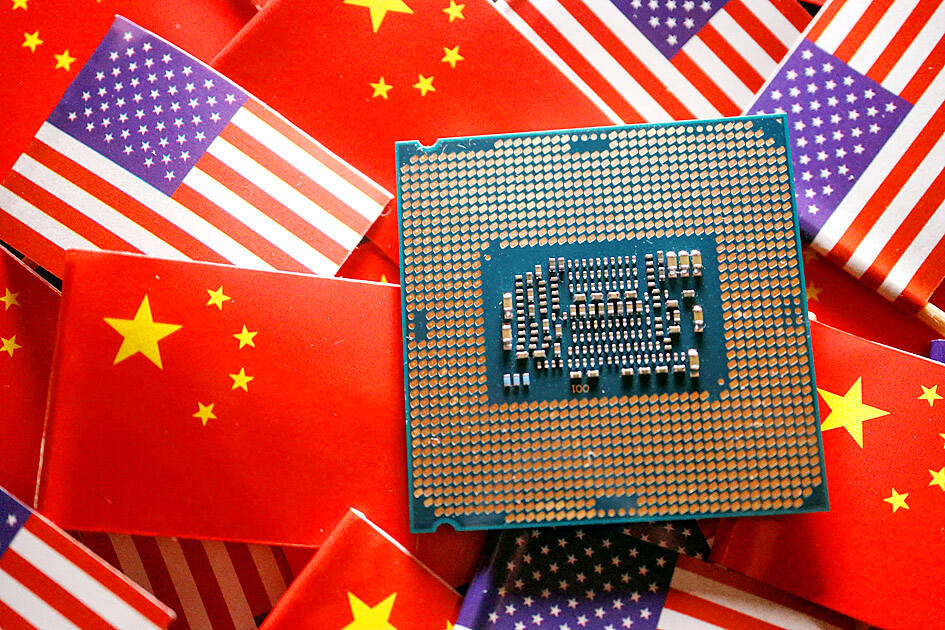A US official was heading to Japan after meeting with the Dutch government to try to push allies to further restrict China’s ability to produce cutting-edge semiconductors, a person familiar with the matter told Reuters on Tuesday.
US Undersecretary of Commerce for Industry and Security Alan Estevez was trying to build on last year’s agreement between the three countries to keep chipmaking equipment from China that could help to modernize its military.
In response, Chinese Ministry of Foreign Affairs spokesman Lin Jian (林劍) said that Beijing was opposed to the US engaging in confrontation and “coercing other countries and suppressing China’s semiconductor industry.”

Photo: Reuters
“This behavior has seriously hindered the development of the global semiconductor industry and will eventually backfire,” Lin told a press briefing in Beijing yesterday.
A spokesperson for the Dutch Ministry of Foreign Affairs confirmed a meeting had taken place in the Netherlands on Monday.
The Japanese Ministry of International Trade and Industry said it has various exchanges with the US, but would not comment on diplomatic interactions.
The US first imposed restrictions in 2022 on shipments of advanced chips and chipmaking equipment to China from companies including California-based Nvidia Corp and Lam Research Corp.
To align with US policy, Japan — home to chip equipment makers Nikon Corp and Tokyo Electron Ltd — in July last year curbed exports of 23 types of equipment, from machines that deposit films on silicon wafers to devices that etch out the microscopic circuits.
Then the Dutch government began to regulate Netherlands-based ASML Holding NV’s sales of deep ultraviolet (DUV) lithography system sales to China and the US imposed restrictions on additional DUV machines to a handful of Chinese factories, claiming jurisdiction because ASML’s systems contain US parts and components. ASML is the world’s biggest chip equipment maker by sales and market capitalization.
Washington is talking to allies about adding 11 more Chinese chipmaking factories to a restricted list, the person said.
There are currently five factories on the list, the person said, including China’s largest chipmaker, Semiconductor Manufacturing International Corp (中芯).
The US also says it wants to control additional chipmaking equipment, the person said.
A spokesperson for the US Department of Commerce declined to comment.
The Dutch Ministry of Foreign Affairs said Monday’s meeting was part of ongoing talks on export policy and security between the US and the Netherlands.
The Netherlands “always has continual contact with our allies,” the spokesperson said.
US officials visited the Netherlands in April to try to stop ASML from servicing certain equipment in China.
However, the ASML servicing contracts are still in place, the person said, adding that the Dutch government does not have the extraterritorial scope to cut them off.

CAUTIOUS RECOVERY: While the manufacturing sector returned to growth amid the US-China trade truce, firms remain wary as uncertainty clouds the outlook, the CIER said The local manufacturing sector returned to expansion last month, as the official purchasing managers’ index (PMI) rose 2.1 points to 51.0, driven by a temporary easing in US-China trade tensions, the Chung-Hua Institution for Economic Research (CIER, 中華經濟研究院) said yesterday. The PMI gauges the health of the manufacturing industry, with readings above 50 indicating expansion and those below 50 signaling contraction. “Firms are not as pessimistic as they were in April, but they remain far from optimistic,” CIER president Lien Hsien-ming (連賢明) said at a news conference. The full impact of US tariff decisions is unlikely to become clear until later this month

With an approval rating of just two percent, Peruvian President Dina Boluarte might be the world’s most unpopular leader, according to pollsters. Protests greeted her rise to power 29 months ago, and have marked her entire term — joined by assorted scandals, investigations, controversies and a surge in gang violence. The 63-year-old is the target of a dozen probes, including for her alleged failure to declare gifts of luxury jewels and watches, a scandal inevitably dubbed “Rolexgate.” She is also under the microscope for a two-week undeclared absence for nose surgery — which she insists was medical, not cosmetic — and is

GROWING CONCERN: Some senior Trump administration officials opposed the UAE expansion over fears that another TSMC project could jeopardize its US investment Taiwan Semiconductor Manufacturing Co (TSMC, 台積電) is evaluating building an advanced production facility in the United Arab Emirates (UAE) and has discussed the possibility with officials in US President Donald Trump’s administration, people familiar with the matter said, in a potentially major bet on the Middle East that would only come to fruition with Washington’s approval. The company has had multiple meetings in the past few months with US Special Envoy to the Middle East Steve Witkoff and officials from MGX, an influential investment vehicle overseen by the UAE president’s brother, the people said. The conversations are a continuation of talks that

Alchip Technologies Ltd (世芯), an application-specific integrated circuit (ASIC) designer specializing in artificial-intelligence (AI) chips, yesterday said that small-volume production of 3-nanometer (nm) chips for a key customer is on track to start by the end of this year, dismissing speculation about delays in producing advanced chips. As Alchip is transitioning from 7-nanometer and 5-nanometer process technology to 3 nanometers, investors and shareholders have been closely monitoring whether the company is navigating through such transition smoothly. “We are proceeding well in [building] this generation [of chips]. It appears to me that no revision will be required. We have achieved success in designing